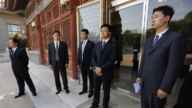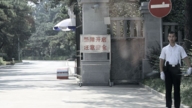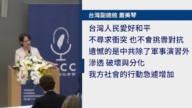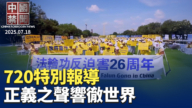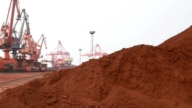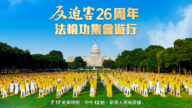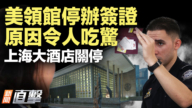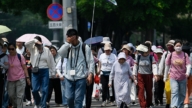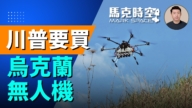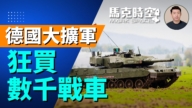【新唐人2014年01月11日讯】北京当局从今年1月1号开始实行的南海捕鱼新规定,引起了国际社会的一些反弹。中共在这个有争议的区域抛出这种规定,与国内的政治局势、军方利益,以及美国重返亚太的国际形势,有什么关系呢?让我们一起听听两位专家的分析。
美国国务院发言人莎琪9号表示,在有争议的地区施加这种限制是“挑衅和危险的行动”。越南捕鱼协会通知渔民继续在南海捕鱼;菲律宾星期五谴责中共“加剧了紧张局势,不必要的使南中国海局势复杂化,威胁到地区的和平与稳定”。台湾陆委会8号表示,从未接受大陆海南省发布的管理条例相关内容,台湾船舶在中华民国固有领土及水域进行活动,中国大陆及国际相关各方应予以尊重。
南海捕鱼新规定,是去年11月底由海南省人大颁布的,要求外国渔民如果在350万平方公里的南海上的200万平方公里中捕鱼的话,必须要先征得中方准许,否则面临没收捕鱼设备和罚款50万元人民币。
美国《中国事务》杂志主编伍凡从国际形势分析,美国重返亚太后,与东南亚、东北亚很多国家在政治、经济、军事上形成了对中共的包围圈,因此中共此举真实的用意是针对美国。
美国《中国事务》杂志主编伍凡:“实际上这个针对的不仅仅是东南国家,事实上针对美国。现在美国要作为东南亚国家的后盾,那么它现在跟美国来对抗,两边就针锋相对了。尽管它的武器说不定还没有打出去,被人家消灭都有可能,但是它认为它正在走这步棋。”
南海有全世界公认的最繁忙的航道,渔业资源也非常丰富,北京划定的区域中包含实际由菲律宾和越南管治的一些岛屿。有中国问题专家担心,这项新规定可能会引发新的争端。
另一方面,北京时政观察人士华颇认为,北京的这个新规定,主要是为了转嫁国内的政治焦点。
北京时政观察人士华颇:“这几天中共高层的动作频频,先是军方将领换衔,最瞩目的是39军的军长潘良实,调任了北京卫戍区的司令员,说是习近平钦点。这一切就是给即将召开的中纪委第三次全体会议铺垫,因为这次‘超级大老虎’周永康可能会正式抛出了。”
美国《大纪元》新闻网评论指出,目前前中共中央政治局常委周永康所属的派别,正在绝地反扑,如所谓“中国首善”陈光标美国之行,就是这一目地。华颇指出,陈光标收购《纽约时报》和染指中共禁区——法轮功问题,都是他们向现任中共高层叫板。
华颇:“这一切的一切,都是不可开交。所以中共为了转嫁这些危局,有可能是突然转变一下风向,宣布加强南海管制。所以可能会引起周边国家的一些激烈反弹,就会转变世界与中国公众的注意力。”
华颇分析,这种争端恰好符合了目前中共军界一些人的利益需求。因为日前国防部发言人否认了建立“联合作战司令部”、和重新划分军区等改革措施,因为这断了军方一些将领上升的空间。
华颇:“如果要在周边地区紧张的话,这种改革肯定要推迟的,而且彰显军方的重要性,就是军方的利益只能够加强,不能够减少;军费不能减反而要加强,还有把更多的资源向我们这边倾斜。”
北京抛出南海捕鱼新规定后,国际舆论的批评主要集中于:“在这种有争议区域,单方面的采取强硬态势,不利于东南亚的和平与经济发展。”
采访编辑/唐音 后制/黎安安
The Hidden Agenda Behind China’s New Fisheries Rule in South China Sea
China’s new fisheries law in South China Sea effective
on Jan. 1 has many countries concerned.
Will the new law regarding this highly controversial area
affect domestic politics and the military as well as effect
the United States’ return to Asia?
The following is our experts’ analysis.
U.S. State Department spokeswoman Jen Psaki indicated
in the Jan.9 daily briefing that restrictions in disputed portions
of the South China Sea are seen as a “provocative
and potentially dangerous act".
Vietnam’s fishermen continue its normal fisheries, and
in a Jan. 10 (Friday) statement, the Philippine Department
of Foreign Affairs said that the new Chinese regulation
“escalates tensions, unnecessarily complicates the situation
in the South China Sea, and threatens the peace and stability
of the region."
Taiwan’s Mainland Affairs has rejected China’s fishing rules
stating that Taiwanese fishermen are proceeding as usual
in Taiwanese waters which ought to be mutually
respected by international communities.
This new law promulgated by the Hainan Provincial People’s
Congress at the end of November last year says that boats
entering Chinese territory within 2 million square km
(770,000 square miles) of the South China Sea,
an area estimated 3.5 million square km
(1.4 million square miles) in size, must first obtain permission
or have their boats and fishing equipment confiscated
and face fines of up to 500,000 yuan ($82,600).
China Affairs magazine editor-in-chief Chris Wu analyzes
that the return of the U.S. to Asia has put pressure
on the Communist regime in politics, economy and military.
He believes China’s new law is meant to target
the United States.
Chris Wu, China Affairs magazine editor-in-chief: “It is
in fact targeting the U.S. more than the other countries.
As the backbone of the Southeast Asian countries,
the United States is the center of the conflict.
Regardless of its military strength, the regime is taking
this route to antagonize the United States."
South China Sea, the world’s busiest waterway,
harbors rich resources.
Beijing’s new law overlaps territory – relevant islands
and reefs – also claimed by the Philippines and Vietnam.
China affairs experts worry that the new law could instigate
fresh disputes.
Beijing politics observer Hua Po analyzes Beijing’s political
agenda behind this new rule is to divert attention away from
domestic political conflict.
Hua Po, Beijing politics observer: “There have been a number
of activities in the Communist central, including the
reorganization of the military generals.
Most notable is 39th Mechanized Group Army Commender
Pan Liangshi, who was transferred to the Beijing Garrison
Command.
It was said to be appointed by Xi Jinping.
In fact, this is to pave the way for the upcoming third
Plenary Session of the central disciplinary commission,
in which the ‘super tiger’ Zhou Yongkang
may be officially sacked."
The Epoch Times commentary has pointed out that
Zhou Yongkang’s cronies have engaged in a series
of retaliatory measures to challenge the current Communist
leadership including sending China’s number one
philanthropist Chen Guangbiao to New York in the name
of acquiring The New York Times and his rehashing
of the Tiananmen self-immolation incident to defame
Falun Gong once he arrived.
Hua Po: “All in all, the CCP is in a bitterly critical situation.
This announcement of the South China Sea, meant to increase
intension, is just to shift the focus.
It brings international criticisms but also takes the world’s
focus off of the Chinese."
Hua Po analyzes this international dispute was in line
with the current personal needs of the regime’s military.
Particularly, the Defense Ministry spokesman recently
denied reform measures such as the establishment of the
“Joint Operations Command" and the re-division of military,
which could lead to promotion cut off in the military.
Hua Po: “The increasing maritime tension will certainly
delay the reform and highlight the importance of the military.
The military budget can only be increased and strengthened,
and even tilted."
Beijing’s new fisheries rule in the South China Sea has drawn
criticism of one consensus internationally –
any unilateral action in a highly disputed area
threatens the peace and economy of Southeast Asia.
Interview & Edit/TangYin Post-Production/LiAnan


